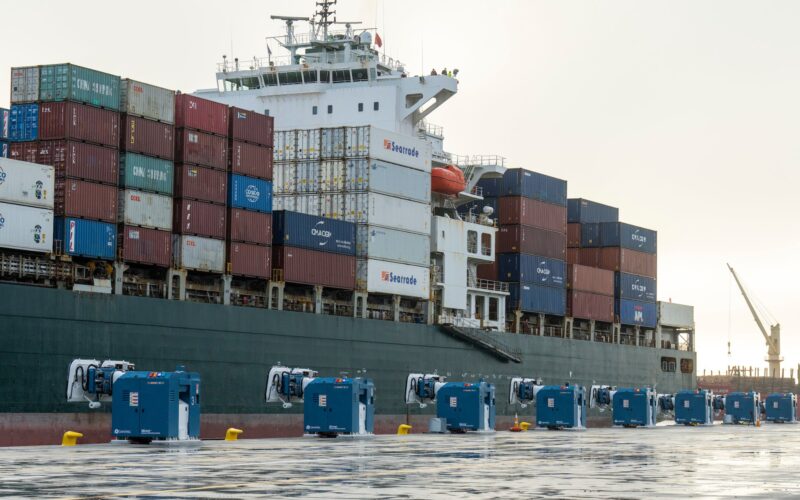The jury is out on the cost implications of the European Union’s move to clip on an emissions surcharge for all ships into EU ports.
But with EU carbon pricing sitting at more than double the New Zealand unit level, it’s not likely to be cheap.
The move follows new legislation requiring cargo and passenger ships of more than 5000 gross tonnes for their carbon emissions under an expanded EU emissions trading scheme (ETS) from January 1 next year.
The EU ETS, the world’s first emissions trading system, aims to reduce greenhouse gas emissions (GHG) by at least 55% by 2030 and ‘climate neutrality’ for EU members by 2050.
Under the extension, EU ports will levy 50% of CO2 emissions from voyages that start or end at EU ports – for example, from Tauranga to Zeebrugge, Belgium, or 100% of emissions that occur between two EU ports.
The rules will apply to all ships, regardless of which flag they fly.
According to carboncredits.com’s live pricing, EU carbon prices were trading on Thursday at €82.76 (NZ$148.86) per unit tonne of CO2. For comparison, the spot NZ unit price ws sitting at about $66.50 at the same time.
The new rules will be phased in over the next few years. Shipping companies must buy and surrender allowances of 40% of applicable emissions next year, 70% from 2025, and 100% from 2027.
The Ministry of Foreign Affairs and Trade (MFAT) reports that under the legislation, each of the 27 EU member state authorities will handle monitoring and compliance.
For non-EU shippers, scheme administration will fall to the member state that “the company visits most frequently in a two-year period”.
A report on international shipping by the International Energy Agency suggests maritime emissions accounted for about 2% of global greenhouse gas emissions last year.
That was after climbing 5% that year from 603 megatonnes (million metric tonnes) to 706 Mt, following declines through the pandemic years in 2020 and 2021.
However, the largest shipping companies have been moving to transition their fleets to lower-emitting fuels.
Danish giant AP Moller-Maersk – the world’s second biggest shipper with almost 700 vessels and a fleet capacity of 23 million ton twenty-foot equivalent units (TEU) last year – has so far ordered 25 emissions-friendly vessels.
It’s just received the first vessel – the Laura Maersk – of six mid-sized container ships using green methanol and oil engines.
A Maersk spokesperson said while the cost of the legislation will increase over the coming years, it expects the direct impacts to NZ exporters to Europe to be about US$21 (NZ$35.50) FFE (forty foot equipment) for dry cargo and about US$32 for reefer (refrigerated) cargo.
The cost of shipping goods can vary widely due to a number of factors but, to give an idea of scale, the typical shipping container currently costs about NZ$1,200 to send to Europe.
However, a spokesperson for the country’s largest shipping company, Kotahi, said it couldn’t yet advise BusinessDesk of the cost implications of the European move.
The company, formed in 2011 by Fonterra and the meat company Silver Fern Farms – who both export most of their products – shipped more than 300,000 TEU containers out of nine NZ ports last year.
Fonterra chief financial officer Neil Beaumont said the move reflected the growing global trend of legislators responding to what voters and consumers are looking for and establishing levers to lower emissions to reach their climate goals.
The size of the EU as a bloc made it a “consequential development”, but Beaumont said it was less about the impacts on Fonterra’s market access than illustrating a “direction of travel”.
That, he said, reinforced Fonterra’s focus on creating efficiencies around how it managed emissions.
That ‘direction of travel’ would include the EU’s carbon border adjustment mechanism scheme, announced last month.
That scheme, which so far applies only to cement, aluminium, electricity, hydrogen, iron or steel imported to EU countries, means exporters will be charged for embedded carbon emissions.
In a note to NZ exporters, NZ Trade and Enterprise said players in those sectors will have to calculate and verify emissions embedded in their imports and report them to the EU from next month until the end of 2025.
From 2026, those embedded emissions will need to be paid for as an offset between the EU and NZ carbon price under the two respective ETS schemes.
Those costs could stack up at the current price, particularly given that EU carbon prices are trading at more than double the NZ ETS unit price.










